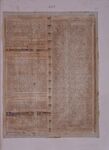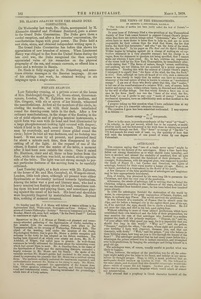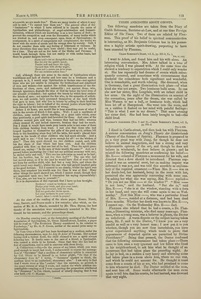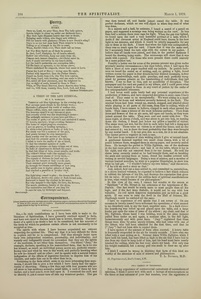Dr. Slade`s Seances with the Grand Duke Constantine
On Wednesday last week, Dr. Slade, accompanied by M. Alexandre Aksakof and Professor Boutlerof, gave a seance to the Grand Duke Constantine. The Duke gave them a cordial reception, and after a few minutes’ conversation, the manifestations began with great power. The Duke held a new slate, alone, and obtained independent writing upon it.
The Grand Duke Constantine has before this shown his appreciation of new branches of science. When Lieutenant Maury was obliged to flee from the United States during the late civil war3 the Duke recognised the then scarcely appreciated value of his researches on the physical geography of the sea, and oceanic currents, so offered him a home and a welcome in Russia.
Dr. Slade is fully engaged in St. Petersburg, and sometimes obtains messages in the Russian language. At one of his sittings last week, he obtained writing in six languages upon a single slate.
The Views of the Theosophists
“The doctrine of motion has been justly called the key of Nature.”—a Maclarin.
In your issue of February 22nd a vice-president of the Theosophical Society of New York comes forward to support Colonel Olcott’s proposition that there are certain beings called “elementals,’’ who “of themselves have no more desire to harm than to help us, and are no more responsible for their actions than the wind that blows, the fire that burns, the flood that devastates;’’ and who “are the force of the wind, the fire, the flood.” In his paper on The Soul and the Spirit Professor Wilder begins by bringing against me a charge of making an ad captandum statement in a very plausible manner; but the charge is so vague, from the statement in question not being specified, that I cannot make out wherein I have erred. He, in fact, confirms my impression of the views held by the New York Theosophists, by immediately afterwards stating that “The forces of nature, though ‘errant, unthinking, and soulless,’ are not lifeless, but are operated by a power superior to themselves.” Reading this with the context of Colonel Olcott’s paper, I interpret it to signify that “the force of the wind, the fire, the flood,” is alive. Now, although we have all heard of vis viva, such a statement seems to me clearly to imply that its author can have no conception whatever of the real nature of what is known to science as “mechanical energy.” I am one of those who freely admit that this, like “matter,” is but one of the manifestations of a creative Will; and, of course, both matter and energy may, within certain limits, be directed and influenced by the will of other beings. But that which directs a force can in no case be the force itself: nor can the “force of the wind, the fire, the flood,” or—as I prefer to say—any “mode of energy” known in mechanical dynamics, have an individuality such as that ascribed to the “elementals.”
I purpose taking up this question when I have sufficient time at my disposal to give it a somewhat adequate treatment.
The equation I gave has been somewhat maltreated. I may express it as follows:—
Kinetic energy=m.v²/64*38 foot pounds.
Here m is the mass, in pounds avoirdupois (of the “wind” or “flood”); v its velocity, in feet per second, which has to be squared, or multiplied by itself, and the foot-pound is the work done in raising one pound avoirdupois through one foot. The “force” or energy of “the fire” is 772 foot-pounds for every unit of heat, i.e., the quantity of heat that will raise the temperature of one pound of water by one degree Fahrenheit.
A Correction
A Correction.—Sir,—In the course of my letter, which you were good enough to insert last week, I endeavoured to expose the assumption of “Scrutator” that a medium of elementary spirits is conceived by Col. Olcott to be himself in no better plight, “So that if the elementary does it,” I wrote, “‘Scrutator’ appears to think, the medium must be an (embodied) elementary also.” I am sorry to find that I wrote must so like “cannot” that the sentence, as printed, is the exact reverse of what I wrote, and makes the whole position unintelligible—reading as if I were supporting the proposition attributed by “Scrutator” to Col. Olcott, instead of utterly denying that it was ever held.— C. C. Massey.
(*) This correction ... to the following letter (see next column) which appeared a week earlier.
Two Critics of Theosophy
Sir,—In my experience of controversial caricatures of misunderstood opinions, I think I never met with such a farrago of misconceptions as the three or four columns of your last number, over the signatures of “M.A., Cantab.” and “Scrutator.’’ Nor by the light of the several communications from Colonel Olcott and Madame Blavatsky (Spiritualist, December 7th and February 8th) can they be regarded as excusable. The epithets “uncharitable,” “self-righteous,” a slanderous,” “effrontery,” “absurd,” “cruel,” may be considered by these writers a fitting response to the appeal with which Madame Blavatsky’s letter concludes. “In the name of logic and common sense, let us, before bandying epithets, submit our differences to the arbitrament of reason.” But there is one precaution in controversy which it is never safe, not to say fair, to neglect. Whenever you are about to impute to an opponent, not being a notorious and previously convicted fool, some transparently absurd, monstrous, and even wicked opinion, first make sure that he holds, or, at least, that he may plausibly be represented as holding it, by possible construction or intendment. Both. “M.A., Cantab,” and “Scrutator,” distinctly attribute to Colonel Olcott the dogma, inference, or assumption, which is stated by “Scrutator” in these wonderful terms:—“Every physical medium is already an astral man, that is, a mere soul, who has already lost his trinity.” Colonel Olcott had said, “Mediumistic physical phenomena are not produced by pure spirits, but by ‘souls,’ embodied or disembodied, and usually with the help of elementals,” and “the whole range of physical phenomena, from rapping to full form presentations, are manifestations of the power of either earth bound elementaries, helped by elementals, or the souls of the mediums themselves,” that is, says “Scrutator,” “souls that have lost their spirits.” “There is no disguising,” he continues, “that the dictum of Colonel Olcott assumes” the proposition above quoted. It is scarcely worth pausing to notice that Col. Olcott’s proposition is in the alternative, “by elementaries or by the soul of the medium,” and thus that even if “Scrutator” had rightly understood instead of having ludicrously misapprehended the meaning of the “soul” or u astral man,” it does not follow that all physical mediums produce the phenomena by their own “souls,” which might, therefore, not have lost their “spirits.” “Scrutator” vaults over this difficulty by saying “the ‘soul’ disembodied only comes through the mediumship of the ‘soul’ embodied, his confrere” So that if the elementary does it, “Scrutator” appears to think that the medium cannot be an (embodied) elementary also. Where does “Scrutator” find it laid down that mediums must be as bad as the bad spirits, or as good as the good spirits, influencing them, or who, not necessarily influencing their thoughts or actions, merely use their mediumship for the production of physical effects? Such effects do not suppose, and are not usually accompanied by even the temporary “control” of the medium during their production. Admitting, therefore, for the moment, the extraordinary assumption incomprehensibly ascribed by “Scrutator” and “M.A., Cantab.,” to Colonel Olcott, that only elementaries and embodied “souls,” which resemble elementaries in having lost their spirits, can effect physical phenomena, it follows that only those mediums who produce the phenomena themselves need be considered in that condition. But the real answer, of course, is that Colonel Olcott’s conception of the “soul” is radically different from what your correspondents suppose it to be. Colonel Olcott, in fact, regards physical phenomena, produced by the “soul” or double, as quite consistent with the purest character, whereas those produced by elementaries do suppose proximity, and therefore a certain affinity, to the medium of these spirits. Witness this passage: “The Katie King of Miss Florence Cook may have been her own double or soul; in fact, I am quite sure it could not have been an elementary, since I am assured that she was a young girl of unblemished character.” I do not like to use Scrutator’s word “effrontery,” but how otherwise in the face of this passage (I could quote others, if necessary) are we to characterise the assertion that Colonel Olcott holds all “souls” producing physical phenomena (including “full form presentations”) to be in the dire condition suggested? Where, in any communication of either Madame Blavatsky or Col. Olcott, does “M.A., Cantab.,” find the proposition, or anything like, or leading to, or possibly involving the proposition that “the astral man, or double or soul,” is “a soul that has lost its divine νους”? “Scrutator” quotes from Colonel Olcott what he calls a “definition” of the astral man, but which is not a definition, but an account of the progress of the astral man who has not lost, and will not lose, his spirit, and of the sinking and ultimate annihilation of the astral man who has lost it. Colonel Olcott does not expressly “define” the soul or astral body. He says we all have it “inside the physical body;” it is that which is disengaged by the death of the physical body; it is simply the “spiritual body” which all Spiritualists believe in. The Theosophists hold that it is sooner or later dissolved, either by the man having become identified with his divine spirit, the αύγοειδής,* or, if the man has become identified with his astral body by loss of all affinity with this spirit, then the dissolution of this astral body is no less the annihilation of “the man”—or, as I ventured to interpret the teaching, of what is then more properly called the elementary, since the trinity of man, which must include the spirit, no <... continues on page 4-234 >
* The αύγοειδής is not perhaps to be considered the spirit itself, but the pure, etherial, and lueiform vehicle of the spirit. This was the opinion of some ancient philosophers. The Buddhist Nirvana, on the other hand, contemplates the ultimate freedom of spirit from all embodiment. Upon this subject, the best single book to consult is that great mine of ancient Theosophy, Cudworth’s Intellectual System.
Editor's notes
- ↑ Dr. Slade`s Seances with the Grand Duke Constantine by unknown author, London Spiritualist, No. 288, March 1, 1878, p. 102
- ↑ The Views of the Theosophists by Fitz-Gerald, Desmond G., London Spiritualist, No. 288, March 1, 1878, p. 102
- ↑ A Correction by Massey C.C., London Spiritualist, No. 289, March 8, 1878, p. 113
- ↑ Two Critics of Theosophy by Massey C.C., London Spiritualist, No. 288, March 1, 1878, pp. 104-5
-
London Spiritualist, No. 288, March 1, 1878, p. 102
-
London Spiritualist, No. 289, March 8, 1878, p. 113
-
London Spiritualist, No. 288, March 1, 1878, pp. 104-5



